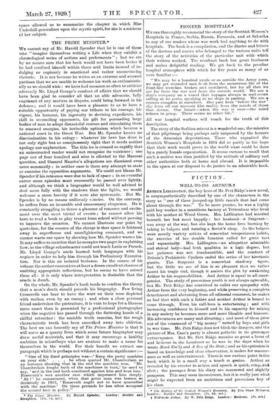FICTION.
WELL-TO-DO ARTRUR-t Anxnun Ianamaron. the boy hero of Mr. Pett Ridge's new novel, is unsympathetically described by one of the characters in the story as "one of these jumped-up little rascals that had come about through the war." To be more precise, he was a highly paid boy worker in a munitions factory at Tottenham who lived with his mother at Wood Green. Mrs. Lidlington had married beneath her but most happily : her husband—a Sergeant— was away at the war, but she kept the home fires burning by taking in lodgers and running a florist's shop. As the lodgers were mostly variety artists of somewhat tempestuous habits, the exercise of her double function called for great tact and equanimity. Mrs. Lidlington—an altogether admirable and stoical lady—had both qualities in a high degree, but her patience was not inexhaustible, and the conduct of Britain's Prehistoric Cyclists ended the series of her histrionic guests. The Sergeant is a somewhat shadowy figure, but the little we see of him is so pleasant that we rather resent his tragic end, though it assists the plot by awakening Arthur to his responsibilities. And Arthur is equal to all emer- gencies. The study of precocious youth is not always agreeable, but Mr. Pett Ridge has contrived to enlist our sympathy with Arthur from the very beginning, and while preserving a complete detachment and abstaining from all editorial comment, he makes us feel that with such a father and mother Arthur is bound to come through. Even his calf-love is entertaining ; and with increasing confidence in himself and in his capacity for mixing in any society he becomes more and more likeable and humane. His adventures are many and diverting and most of them grow out of the command of "big money" earned by boys and girls in war time. Mr. Pett Ridge does not blink the dangers, and the picture of Mrs. Case's party is almost pathetic in its grotesque extravagance. But Mr. Pett Ridge remains as great a lover of and believer in the Londoner as he was in the days when he wrote Mord Em'ly and A Son of the State; and as his optimism is based on knowledge and close observation, it makes for reassur- ance as well as entertainment. There is one curious point lathe book which is in a small way a touch ot genius. Arthur. as revealed by his creator in action and speech is quick, crisp, and alert ; the passages from his diary are mannered and slightly pompous. This may seem inconsistent, but it is really just what might be expected from an ambitious and precocious boy of his class.
• The History of the Scottish Notnen's Hospitals. By Eva Shaw McLaren. London : Hodder and Stoughton. In. 64. net.] t Weil-to-do Arthur. By W. Pett Ridge. London: Methuen. Os. net.]


































 Previous page
Previous page